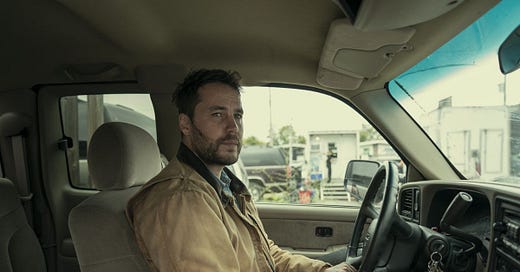Drug Dealers Anonymous
As long as American life was something to be escaped from, the cartel could always be sure of a bottomless pool of customers.
Addiction is straight-up oppressive. I haven’t gotten around to reading Infinite Jest yet. But I know David Foster Wallace continually addressed the topic in his writing. In his essays, he talked about how maybe sewing is better than taking drugs. And perhaps TV is better than shooting H. Everyone is, of course, addicted to the news cycle/timeline. And, I guess, if seeing Trump get read the riot act gets us off, then that can’t be so bad, right? That’s basically a rhetorical question: I’m a user/customer, too—happily foraging for the next hit.
Having battled alcoholism (and overcome it within the last four years), I’m always looking for good series/films/songs that address that dole condition. Painkiller works on several levels: it’s intellectually stimulating to see the unlikely juxtaposition of ostensibly tiresome bean counters doing the Lord’s work, taking on the pharmaceuticals industry, and it’s deeply moving to see decent, honest (and trustworthy) citizens breaking the law to find some notion of satiety.
On her tearjerker cover of Tracy Chapman’s classic “Fast Car,” Jamila Woods sings,
See, my old man's got a problem
He lives with a bottle, that's the way it is
He says his body's too old for working
His body's too young to look like his
When mama went off and left him
She wanted more from life than he could give
I said, "Somebody's gotta take care of him"
So I quit school, and that's what I did
Chapman’s original is ageless. But something about the spare serenity in Wood’s lilt (she’s bruised and poetic, whereas Chapman is grand and hopeful, even). The addicts in both versions (who, notably, never break the law but separate from society) inspire empathy. But Wood’s read implies tragedy. Mama wanted more from life and left the old man, who likely won’t make it, even if he’s getting the love and attention he needs right now.
It’s hard to indict human frailty. “There but for the grace of God go I” hits different when you know that you’re just lulling the microseconds away in your own mediated manner. Ghostface Killah says, “Be nice to crackheads!” and Westside Gunn put neighborhood addict Claire on the cover of his crew’s 2019 album, WWCD, which still (artfully) contains koans like, “My connect like Domino's, I can order a pie/I hit him back like, "Matter fact, I want all your supply.” On the contrary, the anti-drug screed is rarely one you empathize with. (Agree with, support, rage along with, sure. But we never exactly use Feeling Words for jeremiads.)
Obviously, you wouldn’t find the equivalent of a sympathetic bean counter (nor would you want to) anywhere in music. When KRS-One observes, “A guy named Jack is selling crack/The community doesn’t want him back,” on Boogie Down Productions’s 1988 song, “Illegal Business,” he’s as peeved by the system as Painkiller’s Edie Flowers. But, crucially, we instantly resonate with his message and methodology as he brilliantly points out how “Cocaine business controls America.”
Painkiller’s Flowers (played by a red-hot Uzo Aduba) isn’t all that likable. Her whole aura is button-down and bureaucratic, which, I guess, makes sense for a US prosecutor. Still, it thrilled me to see her story unfold over Painkiller’s six episodes, which show why a Black woman in D.C. might find it important to take on “the new crack.”
Addicts from parts of the country where phrases like “lock her up!” are de rigeur suffer back pains. And they basically need to get back to work. It’s not “sexy.” There’s no clandestine sneaker boxes or scintillating slang—just a stark portrayal of what happens to the country cast of season two of The Wire. And the real-life confessionals at the start of each episode make you want to turn everything off and join a protest. But you’re too busy fiending for the next story to unfold.




